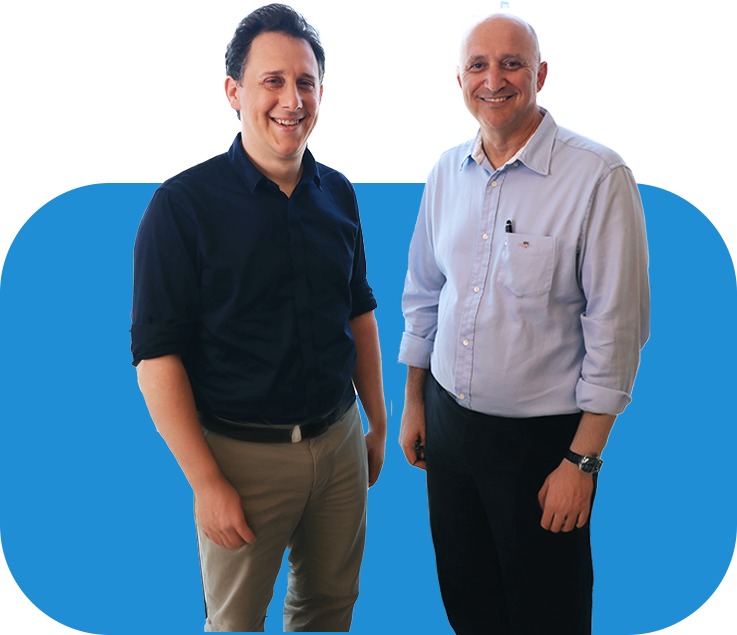About Us
- ראשי
- >
- EN

The Israeli Stroke Center Clinic offers comprehensive and advanced solutions for the diagnosis, prevention, and treatment of stroke.
The clinic focuses on providing the highest level of medical services, utilizing innovative technology and a team of highly experienced specialists. Services at the clinic include early diagnosis processes, personalized treatments, and rehabilitation programs, all under one roof.
The clinic is designed to provide stroke patients and their families with professional support and a calming environment, emphasizing personalized and compassionate care, with close guidance from diagnosis through the completion of the rehabilitation process.
Medical Tests at the Israeli Stroke Center.
Carotid Doppler: An ultrasound test that evaluates blood flow in the neck arteries. It is used to diagnose stenosis (narrowing) and atherosclerosis. It is an important tool for assessing stroke risk.
TCD – Doppler: An ultrasound test to evaluate blood flow in the brain arteries. It is used to diagnose stenosis and atherosclerosis.
TCD with Bubbles: An ultrasound test performed in the presence of a physician, combined with the injection of agitated saline (saline with tiny air bubbles). It is used for the diagnosis of right to left shunt, usually throw the patent foramen ovale (PFO).
Holter Monitor (Heart): An automatic device that monitors heart rhythm for 24-48 hours. It diagnoses arrhythmias (such as atrial fibrillation) that can cause a stroke.
Holter Blood Pressure Monitor: An automatic device that monitors blood pressure over a 24-hour period. It is an important tool in the diagnosis and treatment of hypertension
Additional tests coordinated quickly and efficiently at the center.
Brain CT: A radiation-based imaging test without contrast material. It is used to diagnose strokes, hemorrhages, and other intracranial issues.
CTA : A CT scan with the injection of contrast material. This is a fast and easily performed test with high availability. It involves radiation and iodine administration. The test is used to diagnose vascular disorders in the neck and brain with high accuracy.
MRI: It is usually performed with the injection of contrast material . The test is highly sensitive in detecting brain strokes, hemorrhages, inflammation, and tumors. Additionally, the test can diagnose vascular disorders. The test has two disadvantages: it is not as readily available as CT, and the test itself involves prolonged time in a confined space inside the machine (problematic for those with claustrophobia).
Echocardiography: An ultrasound of the heart. It identifies several conditions that can increase the risk of stroke, such as heart valve disorders, left atrial enlargement, impaired contraction of the heart wall, and more.
Prof. Hallevi and Dr. Molad have co-founded the Israeli Stroke Center, offering a holistic and professional approach to treating stroke patients. Their extensive clinical and academic experience in the stroke field and in medical management have given them a deep understanding of patient care, providing comprehensive support to both patients and their families.
Their shared goal is to establish and operate a unique center in Israel that will serve as a center of excellence for treating individuals who have suffered a stroke or have cerebrovascular conditions.
The center will provide professional, high-quality, and comprehensive care, focusing on personalized medicine and advanced therapeutic approaches.
Prof. Hallevi and Dr. Molad are committed to significantly improving patients' quality of life and optimizing recovery after a stroke.
Prof. Hen Hallevi is head of the Neurology-Stroke Department at the Neurology Division of Tel-Aviv Sourasky Medical center (Ichilov).
Prof. Hallevi studied medicine at Ben-Gurion University and did his residency in neurology at Soroka Medical Center He did stroke fellowship in Houston,Texas. afterwards he served as a senior physician in the Neurology department at Tel-Aviv Medical Center. Prof. Hallevi was appointed to be the director of the Neurology Department at Carmel Hospital in Haifa 2014-2016.
Prof. Hallevi returned In 2016 Tel-Aviv Sourasky medical center to found the first stroke department in Israel.
Prof. Hallevi is considered one of the leading stroke specialists in Israel, focusing on advanced medical interventions, stroke prevention, and innovative rehabilitation techniques. He conducts clinical research on stroke prevention, cognitive decline post-stroke, and acute stroke treatment, having published numerous articles and being a respected speaker at international conferences.
Dr. Jeremy Molad is the Deputy Director of the Neurology Division and a Senior Deputy Director of the Neurology-Stroke Department at Tel-Aviv Medical Center (Ichilov).
Dr. Molad obtained his medical degree from the Sackler Faculty of Medicine at Tel Aviv University and completed his residency in neurology and stroke fellowship at the Tel Aviv Medical Center. In 2016 he joined prof Hallevi to found the first stroke department in Israel. Dr Molad also heads the TCD & Doppler laboratory in Tel-Aviv Medical Center.
Dr. Molad is recognized as one of the leading and respected stroke physicians in Israel, with expertise in diagnosing ischemic and hemorrhagic stroke causes, stroke prevention and treatment, small vessel brain disease, post-stroke cognitive decline, and brain and vascular imaging.
Dr.Molad has published about 50 articles i leading scientific journals and in A sought-after speaker at conferences in Israel and abroad.
Interested in receiving advice or making an appointment at the clinic?
Leave details and we will get back to you as soon as possible

